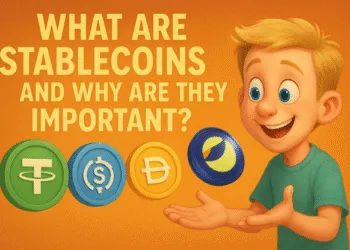Cryptocurrency is one of the most talked-about innovations of the 21st century, yet many still struggle to understand what it actually is. Is it just “internet money”? A risky investment? Or the future of finance?
In this beginner-friendly guide, we’ll break down what cryptocurrency really means, how it works, and why it’s becoming a key player in the global economy. By the end, you’ll have a clear foundation to begin exploring the crypto world with confidence.
Ready to take the next step after learning the basics? Check out our guide on How to Buy Your First Crypto or explore the Best Crypto Wallets in 2025 to get started safely.
What Is a Cryptocurrency?
A cryptocurrency is a form of digital money that exists purely online and operates without the need for a central authority, like a bank or government. Unlike traditional currencies such as the US dollar or euro, cryptocurrencies are decentralized, meaning they’re maintained by a distributed network of computers around the world.
The word “cryptocurrency” combines “crypto”, referring to cryptographic security, and “currency”, meaning a medium of exchange. This technology ensures that transactions are secure, transparent, and nearly impossible to alter once confirmed.
The first and most well-known cryptocurrency, Bitcoin, was launched in 2009 by an anonymous figure known as Satoshi Nakamoto. It was designed to provide an alternative to traditional financial systems—one that’s open, borderless, and resistant to censorship.
How Does Cryptocurrency Work?
At the core of every cryptocurrency is a technology called blockchain—a digital ledger that records all transactions across a network of computers. Every time someone sends or receives cryptocurrency, that transaction is added to a block. Once the block is full, it’s linked to the previous one, creating a secure and transparent chain of records.
Unlike traditional financial systems that rely on centralized banks to verify transactions, cryptocurrencies use a peer-to-peer network. This means transactions are verified by independent participants (called “nodes”) using algorithms and consensus mechanisms such as Proof of Work (PoW) or Proof of Stake (PoS).
Each user stores their cryptocurrency in a digital wallet, which is protected by cryptographic keys. A public key works like your bank account number, while a private key is like your PIN—used to authorize transactions. Losing your private key means losing access to your funds.
Here’s a simple breakdown of how it all comes together:
- You send crypto from your wallet to someone else
- The network verifies the transaction
- The transaction is added to the blockchain
- The recipient receives the crypto
Want to understand how these wallets actually work? Check out: How to Set Up a Crypto Wallet (Step-by-Step)
Types of Cryptocurrencies
Not all cryptocurrencies are created equal. While Bitcoin was the first and remains the most recognized, thousands of others have emerged—each with different purposes and features. Here are the main categories you should know:
- Bitcoin (BTC)
The original cryptocurrency, created to serve as digital gold—a store of value and a decentralized alternative to fiat currencies. Bitcoin’s main focus is security, scarcity, and censorship resistance.
- Altcoins
Any cryptocurrency that isn’t Bitcoin is considered an “altcoin.” These include popular projects like:
- Ethereum (ETH) – Focused on smart contracts and decentralized applications (dApps)
- Solana (SOL) – Known for high-speed transactions
- Cardano (ADA) – Built for scalability and sustainability
- Stablecoins
Stablecoins are pegged to traditional assets like the U.S. dollar or gold. They’re designed to reduce volatility, making them ideal for payments and DeFi. Examples include:
- USDT (Tether)
- USDC (USD Coin)
- DAI
- Utility Tokens & Governance Tokens
These are used within a specific ecosystem:
- Utility tokens give access to features or services (like paying fees on a platform)
- Governance tokens allow holders to vote on future updates or proposals in decentralized protocols
What Can You Do with Cryptocurrency?
Cryptocurrencies aren’t just digital collectibles or speculative assets — they have real-world use cases that are growing every day. Here are some of the most common ways people use crypto today:
- Investing and Trading
Many people buy cryptocurrencies hoping they will increase in value over time. While some hold long-term (HODL), others trade daily, taking advantage of price fluctuations.
- Sending and Receiving Money Internationally
With crypto, you can send money across the globe in minutes — no bank delays, high fees, or currency conversions. It’s particularly useful in countries with unstable currencies or limited access to financial services.
- Web3, Gaming & NFTs
Crypto is powering a new era of internet apps and games where you actually own your assets. Whether it’s earning tokens while playing or buying/selling NFTs, digital ownership is now possible.
- DeFi (Decentralized Finance)
DeFi lets you borrow, lend, earn interest, or swap tokens — all without a traditional bank. Platforms like Uniswap, Aave, and Compound run entirely on code.
- Payments and Shopping
Some merchants, both online and offline, accept crypto as payment — and this number is steadily growing. You can even get crypto debit cards to spend your assets like regular money.
Frequently Asked Questions
Is cryptocurrency real money?
Cryptocurrency can be used like money — to buy goods, send payments, and store value — but it’s not backed by a central bank or government. Its value is based on supply, demand, and utility. Some stores accept crypto, and with crypto debit cards, you can even spend it like fiat.
Can you make $1,000 a month with crypto?
Yes, but it depends on your strategy and risk tolerance. Some people earn through trading, staking, yield farming, or creating content in Web3. Keep in mind that earnings are not guaranteed, and crypto markets are volatile.
Can I become a millionaire with crypto?
It’s possible — many early adopters did. But it involves high risk, timing, and usually some luck. Crypto can grow fast… and fall just as quickly. Always invest only what you can afford to lose.
Which crypto should I buy now?
There’s no one-size-fits-all answer. Bitcoin and Ethereum are considered safe long-term picks, while newer tokens offer high-risk/high-reward opportunities. Your choice should reflect your goals, risk profile, and research.
Should I invest in crypto or stocks?
Crypto is riskier but has higher potential returns. Stocks are generally more stable. Many investors choose a mix, but if you’re just starting, focus on learning both before making a decision.
Final Thoughts: Why Understanding Cryptocurrency Matters
Cryptocurrency isn’t just a buzzword — it’s a technology that’s reshaping how we think about money, ownership, and the internet itself. Whether you’re looking to invest, send money globally, or simply stay informed about the future of finance, understanding the basics of crypto is your first step.
Now that you know what cryptocurrency is and how it works, you’re ready to take the next step in your journey.
What to Read Next:
- What Happens If You Lose Access to Your Wallet? (And How to Prevent It)
- Best Mobile Crypto Wallets for iOS & Android (2025 Edition)









